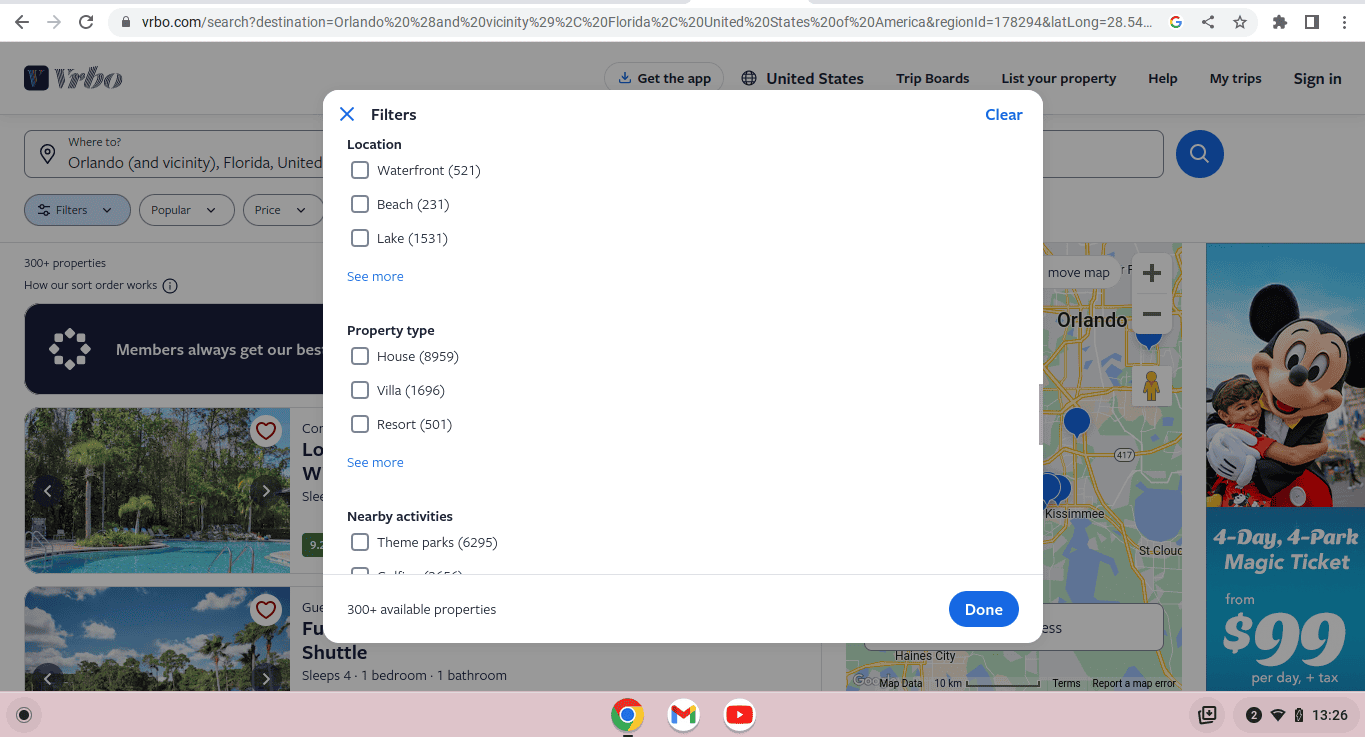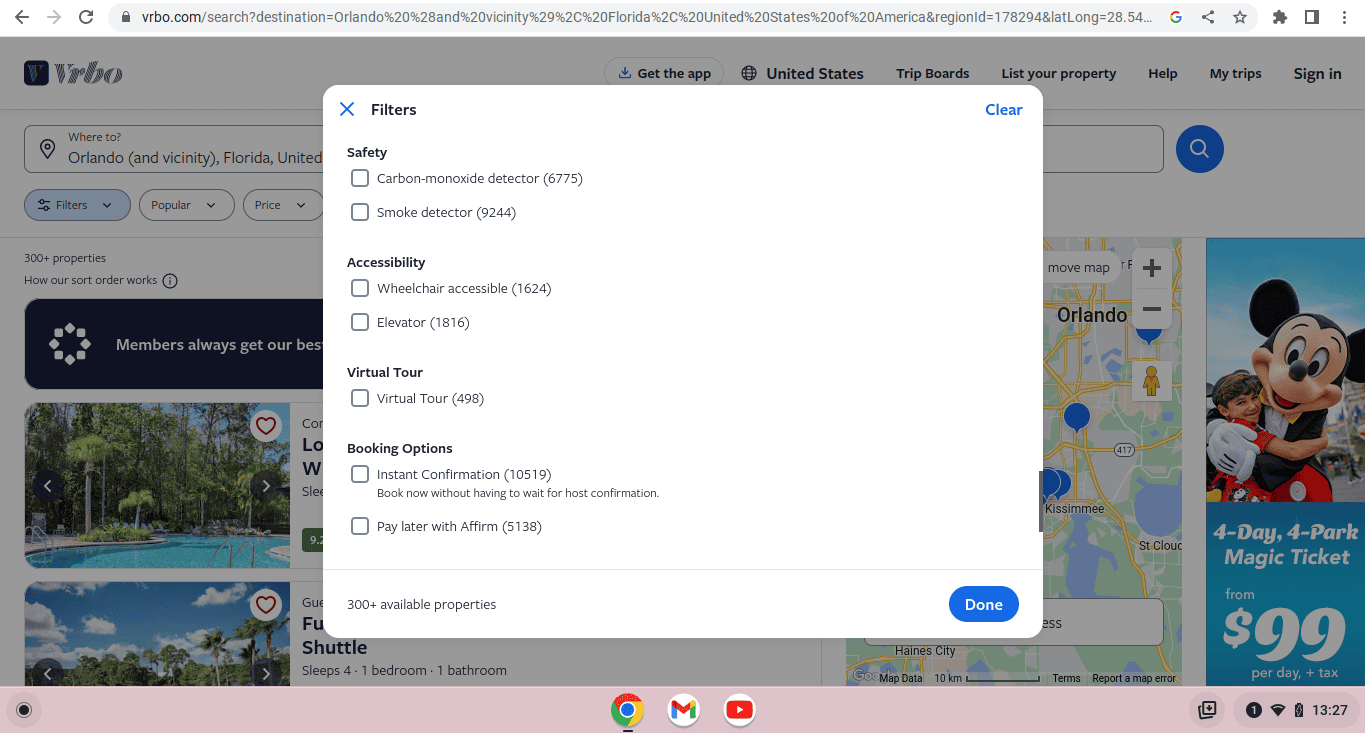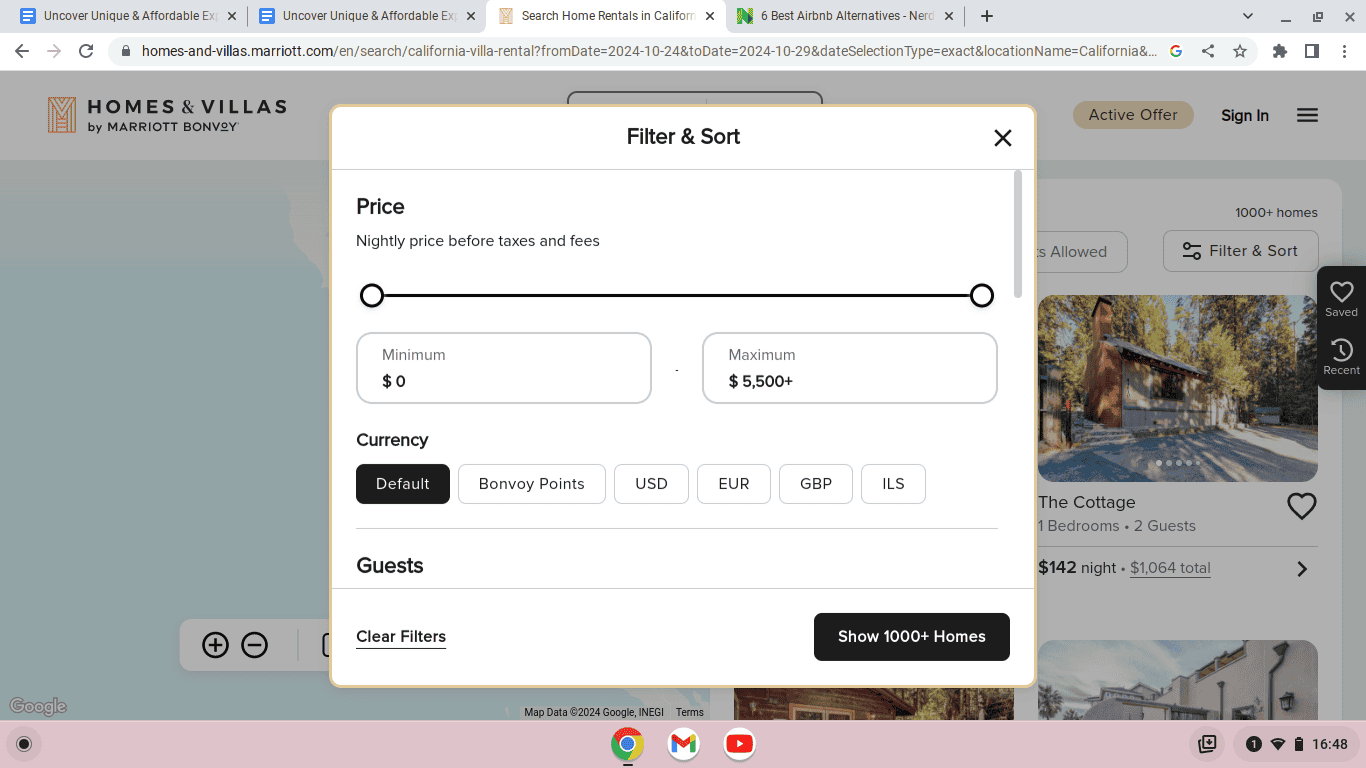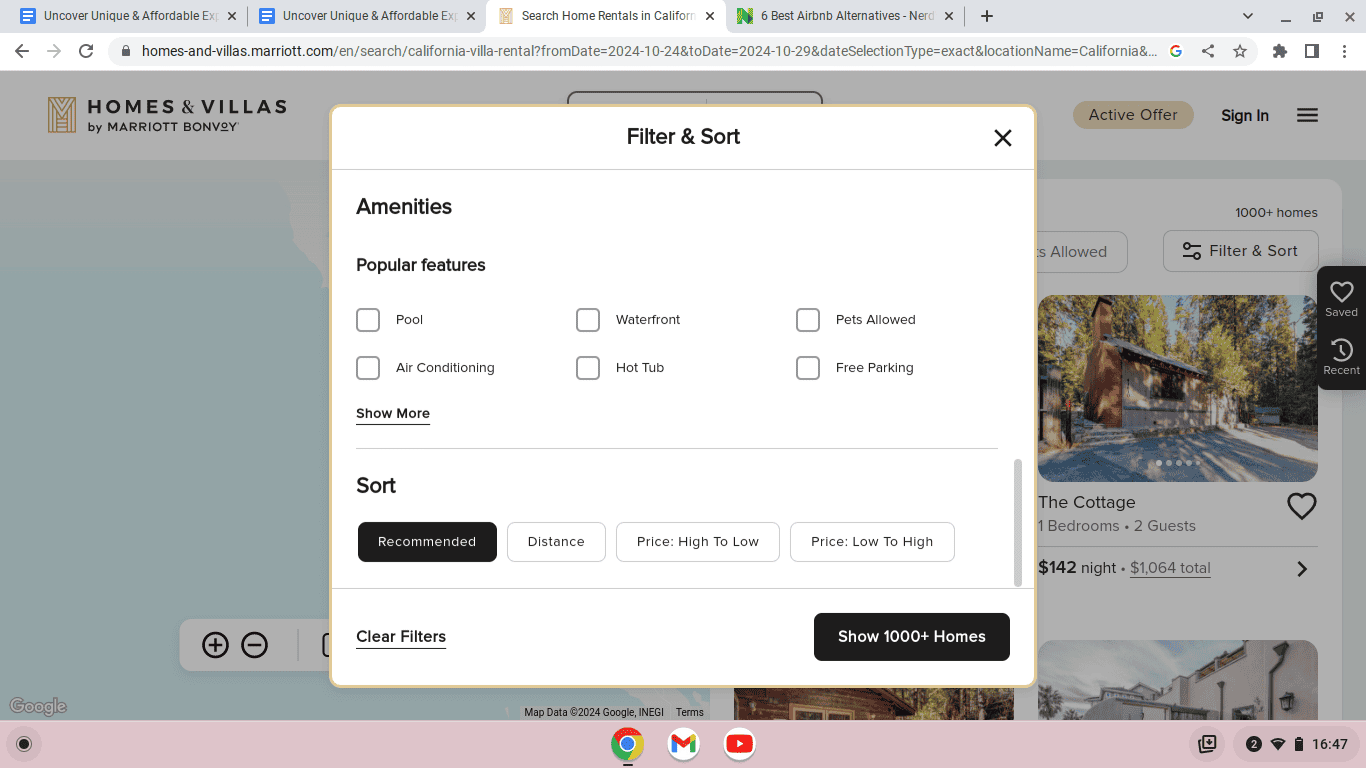
10xTravel is part of an affiliate sales network and receives compensation for sending traffic to partner sites, such as CreditCards.com. This site may earn compensation when a customer clicks on a link, when an application is approved, or when an account is opened. This compensation may impact how and where links appear on this site. This site does not include all financial companies or all available financial offers. Terms apply to American Express benefits and offers. Enrollment may be required for select American Express benefits and offers. Visit americanexpress.com to learn more. All values of Membership Rewards are assigned based on the assumption, experience and opinions of the 10xTravel team and represent an estimate and not an actual value of points. Estimated value is not a fixed value and may not be the typical value enjoyed by card members.
Note: Some of the offers mentioned below may have changed or may no longer be available. The content on this page is accurate as of the posting date; however, some of our partner offers may have expired. You can view current offers here.
As seasoned vacationers and travel enthusiasts know, where you stay is almost as important as where you go. A rental property with misleading online photos can break a vacation as much as a treehouse-style hotel room can make it.
While Airbnb used to rule the unique and affordable vacation rental arena, people have begun looking for alternatives in response to its increasing prices and the dominance of professional management companies on the platform. Whether you’re after an authentic experience, an affordable holiday home or the ability to pay for your stay using hotel rewards points, there are many Airbnb alternatives to consider.
Let’s take a look at some popular alternative sites to Airbnb.
The Evolving Landscape of Travel Accommodations
San Francisco-based business Airbnb offers more than eight million home listings across 220 countries. However, despite dominating the home sharing and vacation rental property market, Airbnb is not what it once was — many of its unique selling points have been diluted by its growth.
Airbnb originally bridged the gap between travelers looking for a cost-effective place to crash and homeowners looking to earn rental income on the side. It was a win-win for both parties. Not only did it offer travelers a cheaper alternative to hotels, it also offered them a more authentic travel experience and a way to connect with the locals.
Yet, in recent years, much of Airbnb’s original allure has vanished. Since its rapid growth, large property management companies, hotels and landlords have jumped on the bandwagon, hiking up rental prices significantly. For instance, more than 30% of active Airbnb listings in the United States belong to hosts with more than 21 rental properties — an ocean apart from the platform’s humble beginnings.
Cities like Barcelona, New York and the state of California have gone as far to put restrictions on short-term rental properties, in response to the boom in prices and worsening housing crisis.
Likewise, complex check-in rules, checkout “checklists” and cleaning fees often make the entire Airbnb experience more work than simply paying for a hotel room — not to mention, equally or more expensive.
While they still can find Airbnb listings that retain the original charm of the platform, travelers have begun to look elsewhere when it comes to vacation rentals.
The Best Airbnb Alternative Platforms
Let’s take a look at five of the best Airbnb alternatives.
| Platform | Reach | Number of Listings | Best For |
|---|---|---|---|
| Vrbo | 190 countries | 2 million + | A similar experience to Airbnb at an often lower price |
| HomeExchange | 187 countries | 150,000 | Exchanging homes with other travelers and avoiding rental costs |
| Booking.com | 227 countries | 28 million + | Accessing the widest range of properties and prices |
| Marriott Homes and Villas | 132 countries | 130,000 + | Luxury rentals with the ability to earn and redeem Marriott Bonvoy points |
| Wyndham Vacasa | U.S., Mexico, Costa Rica, Belize and Canada | 15,000 + | Rentals you can pay for using Wyndham points |
1. Vrbo: Vacation Rentals for Every Type of Traveler
Despite being founded 13 years before Airbnb, Vrbo (“Vacation Rentals by Owner”) is a lesser-known Airbnb alternative.
Vrbo was originally acquired by HomeAway in 2006 and both were later acquired by The Expedia Group in 2015. Eventually, in 2020, the two sites merged under the name of Vrbo.
Today, Vrbo boasts more than two million vacation rentals across 190 countries.
It offers a similar user interface and property types to Airbnb, albeit with fewer total listings. Unlike Airbnb, Vrbo offers exclusively standalone rentals — so you can forget about crashing in someone’s guest bedroom for the night.
Vrbo’s search function operates similarly to Airbnb’s with the ability to filter your search based on several factors from property type and pet policies to nearby attractions and more. Your search can also be filtered based on user reviews, allowing you to find the best-rated properties in your search area.
Just like Airbnb’s Superhost status, Vrbo also rates certain hosts as Premier Hosts, giving their listings more visibility and ensuring their trustworthiness. The eligibility requirements needed to meet Premier Host status is similar to that of Superhost status.
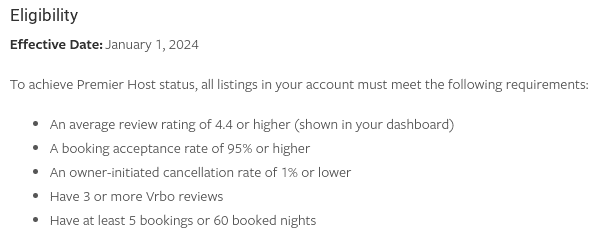
Eligibility requirements for Vrbo Premier Hosts.
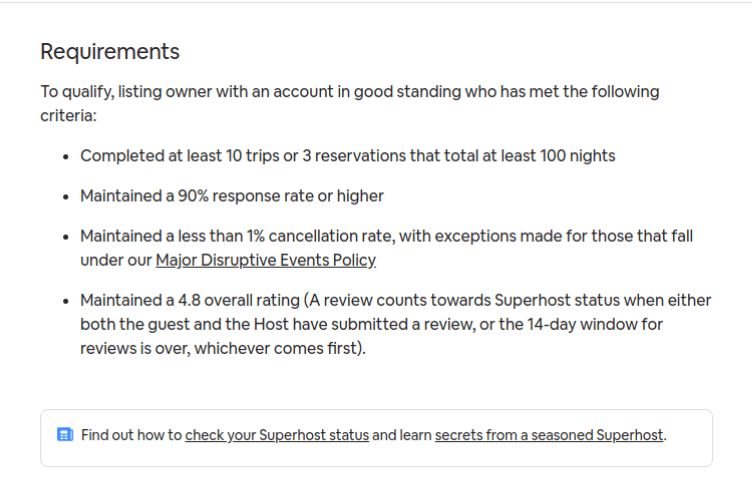
While Vrbo tends to be a cheaper alternative to Airbnb, it isn’t always the case.
This is due in large part to Vrbo having only a quarter of the total listings Airbnb has, making for a smaller price spectrum.
Likewise, booking through Vrbo can often be cheaper during peak travel times, since Airbnb still tends to be the go-to website for most travelers looking for a vacation rental. Some hosts have even been reported to list the same property cheaper on Vrbo and more expensive on Airbnb.
Let’s take a look at an example showing the difference between Vrbo vs. Airbnb’s availability. For this property in Orlando, Florida, at the end of October, Vrbo shows results for 300 properties while Airbnb offers more than 1,000 — a difference of more than triple the amount of available properties.
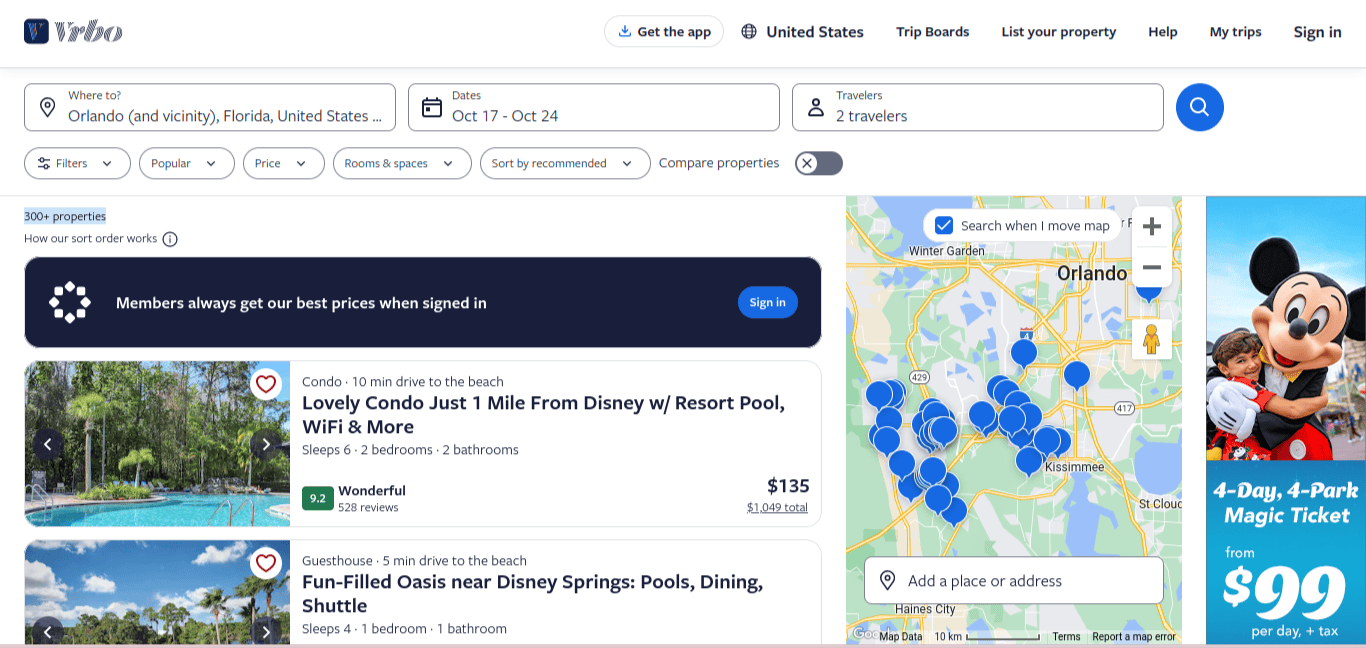

Cancellation policies also differ slightly between Vrbo vs. Airbnb. While both offer their own versions of “Strict,” “Firm,” “Moderate” and “Relaxed/Flexible” cancellation policies, Vrbo gives its hosts the option to set their own cancellation policies. This means you need to pay extra attention to the fine print when making Vbro bookings, otherwise, you may end up losing money unnecessarily if you cancel.
A unique aspect of Vrbo is that it offers its own rewards program — OneKey — that enables you to earn OneKeyCash on your bookings. To be specific, OneKey is the rewards program of The Expedia Group, which owns Vrbo. As a member, you can earn up to 2% in OneKeyCash on vacation rentals made through Vrbo. You’ll also earn 2% in OneKeyCash on eligible hotels, activities, packages, car rentals and cruises booked through Expedia.
One dollar of OneKeyCash is worth $1 USD when redeemed. You can then redeem these rewards for discounted stays with Vrbo.
2. HomeExchange: Home-Like Stays Abroad
HomeExchange has a unique business model that stands out from other vacation property rental websites. Their website is easy to navigate and offers over 150,000 properties around the world. HomeExchange allows you to swap homes with another member, free of any rental costs. This offers the potential for unique experiences, making it a great alternative to Airbnb.
You can opt for four different types of stays:
- Reciprocal simultaneous exchanges — in which you exchange houses at the same time
- Reciprocal non-simultaneous exchanges — in which you exchange houses at different times
- Non-reciprocal stays in exchange for Guest Points — in which you pay to stay in a house using Guest Points, but the host doesn’t stay at your house
- Hospitality stays — in which you stay at a house while the host is living there
To get started, you need to become a host with HomeExchange. This involves listing your home on their website and providing pictures and information about any amenities. You’ll then need to pay a membership fee of $220 per year to finalize any home exchanges.
While this fee may seem steep, avid home exchangers can easily offset this fee in a single stay — if not a single night, depending on the property type. That’s because HomeExchange hosts don’t charge for renting their homes. Instead, “payment” is made by offering your home in return as a place to stay or by using Guest Points — HomeExchanges’s rewards currency — to pay for non-reciprocal stays.
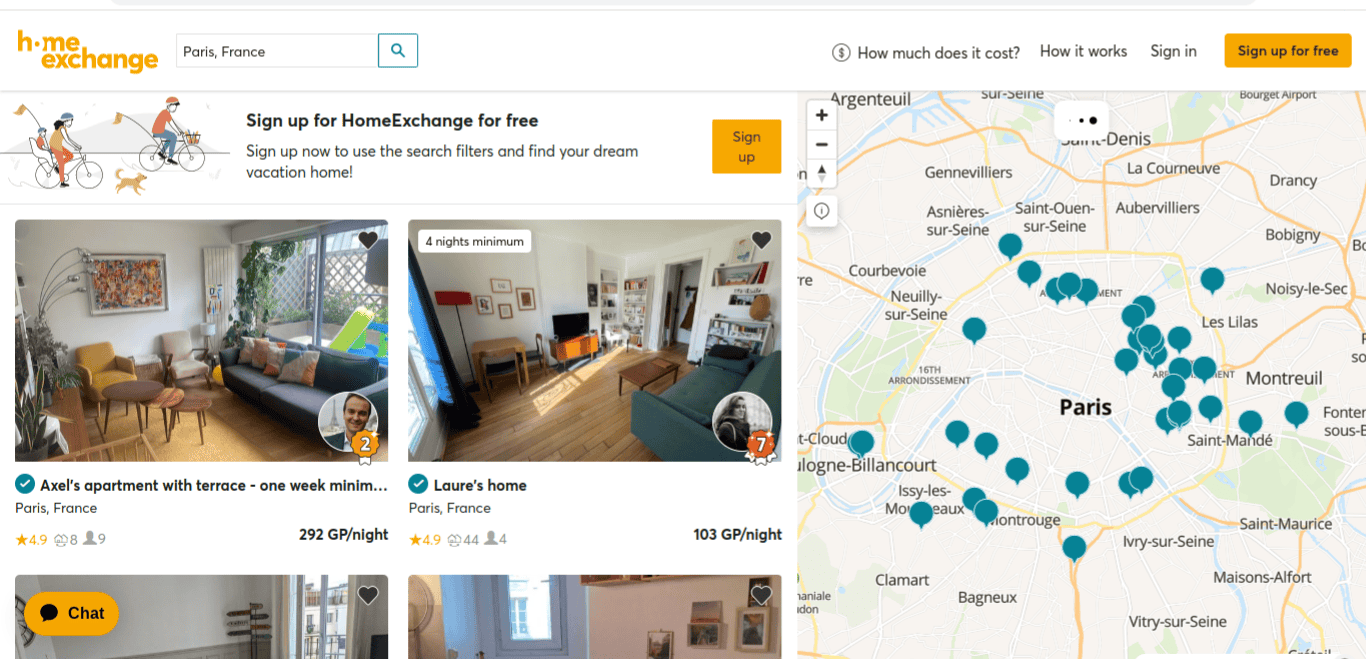
Every property is accompanied by detailed information, reviews and information about the host — in particular, the number of exchanges they’ve participated in.
One of the standout features of HomeExchange is its affordability and the opportunity it offers for unique experiences. Through them you can find all sorts of property types, whether it’s an apartment in Paris, a townhouse in London or a beachfront lodge in New Zealand. HomeExchange offers similar charm as Airbnb properties but without the often exorbitant costs and uncertainty.
Once an exchange is finalized, HomeExchange offers you the following protections as a guest:
- You can receive compensation of up to $120 per night if your host cancels and HomeExchange can’t find you an alternative accommodation within 50 km of the original destination
- HomeExchange covers property damage of up to $1,000,000 over and above the $500 deductible (taken from your deposit)
As a host, you’ll also receive the following protections:
- A deposit of up to $500 is payable by your guest for minor damage
- HomeExchange covers property damage up to $1,000,000 USD
- HomeExchange covers you in the event of theft
The main downside to HomeExchange is that it’s not an instant booking solution — it’s closer to a home dating app than a booking app. Home exchanges often take time to organize and aren’t guaranteed until the moment the exchange is finalized by both parties. So if you’re looking for a quick solution, HomeExchange typically won’t cut it — that’s unless you strike luck.
Likewise, if you’re not interested in hosting your home, you’ll need to look further than HomeExchange.
3. Booking.com: Diverse Accommodations for Every Budget
If you want professional management, competitive prices and transparency, Booking.com is a great Airbnb alternative.
Booking.com offers everything from apartments and private-run vacation rentals, to hotels and more. It has more than 28 million active accommodation listings, 6.6 million of which are unique homes and apartments.
This wide scope enables you to compare both private-run rentals and commercial properties such as hotels to see which will give you the better price.
Booking.com’s search function enables you to easily sort results based on price, guest reviews, distance from your target location and other factors. It also offers a wide range of filters to enable you to narrow down your search results.
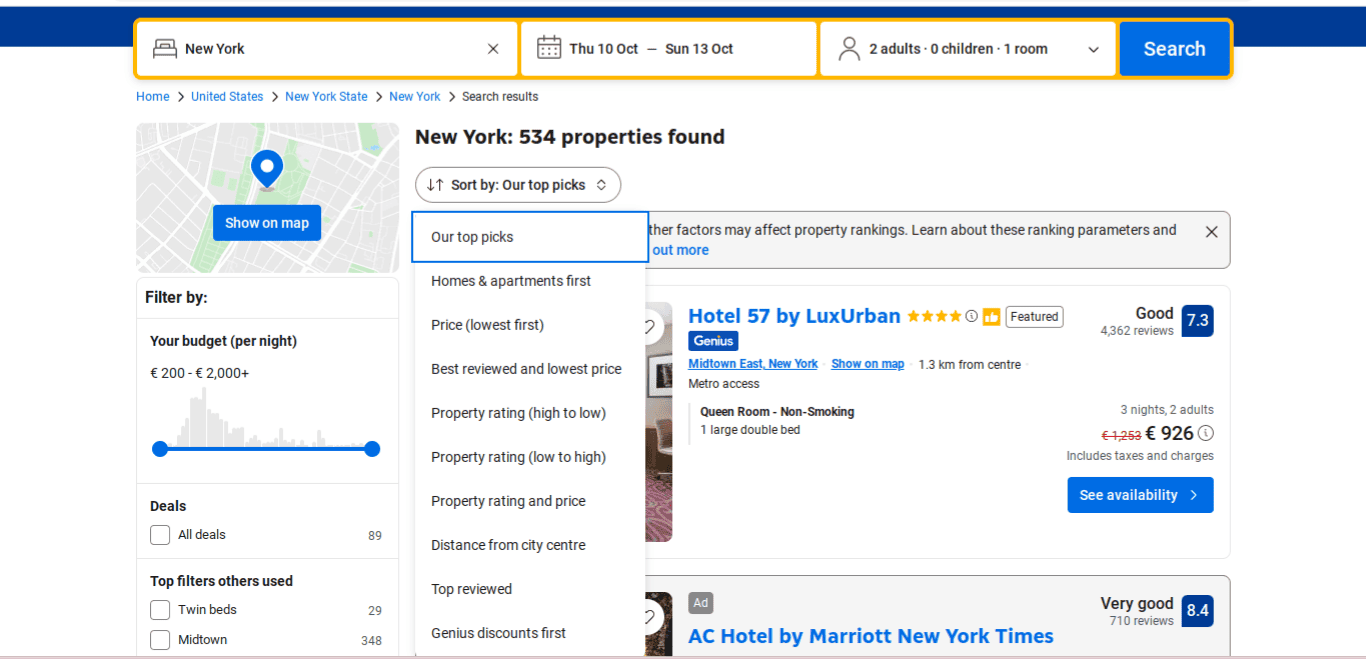
Just like Airbnb, every property is accompanied by guest reviews which you can search through using specific keywords. There are also overall category ratings for each property such as “Comfort,” “Facilities,” Cleanliness” and more. That makes the booking process more transparent, enabling you to better determine the quality of the property.
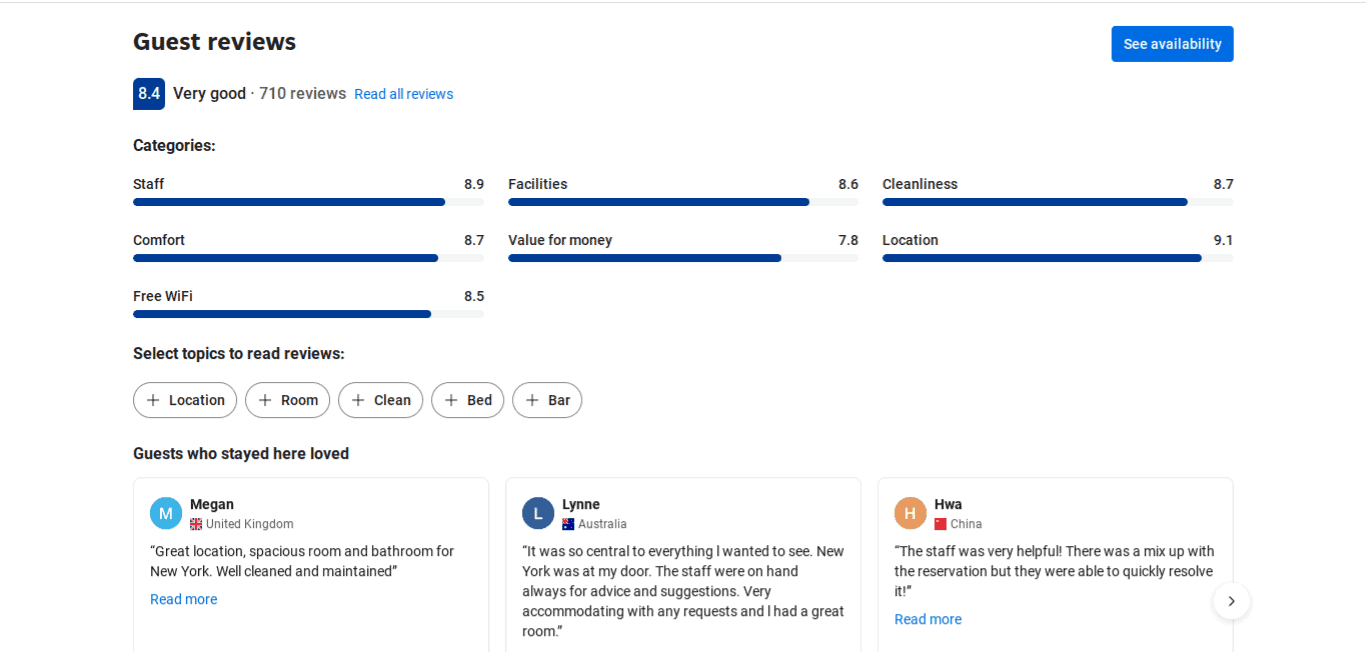
Booking.com’s pricing is also very clear, with no hidden costs, and a typical free cancellation policy of up to 24 hours before your arrival — although this can differ per property and room type. Its website also makes it easy to navigate through every property’s features and amenities, as well as its different room types and prices, with an additional FAQ list at the end of each listing.
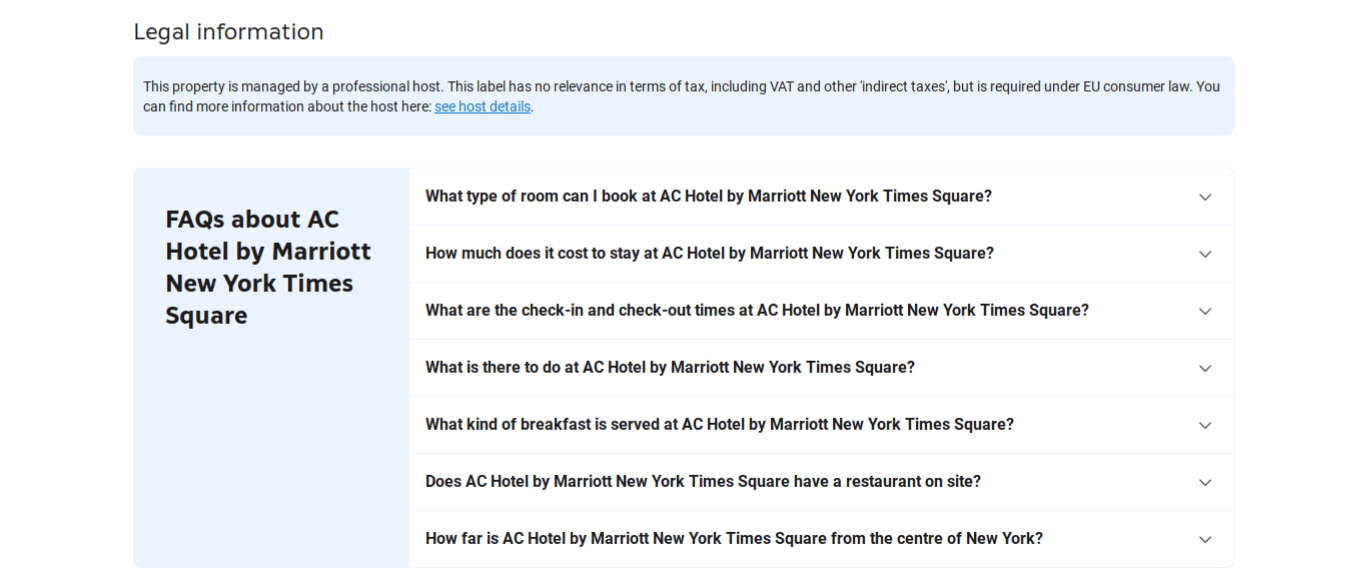
Many of Booking.com’s non-hotel vacation rentals are professionally managed, making it less likely that you run into issues during your trip.
Many users report finding better prices on Booking.com compared to using Airbnb. Booking.com offers a much wider range of property types and thus prices, making it easier to find one for your price range.
The only potential downside to Booking.com is that it’s dominated by hotels. So if you’re looking to find a unique home to stay at, it can be a little harder compared to Airbnb — that said, Booking.com still boasts 6.6 million non-hotel properties.
However, if your main goal is to find an affordable property for every price range, Booking.com is a solid alternative to Airbnb.
4. Marriott Homes and Villas: Luxury Rentals with Brand Assurance
It’s no surprise that the world’s largest hotel chain also has a foothold in the vacation rental business.
Marriott Homes and Villas partners with professional property management companies to offer luxury rentals to travelers. Expect everything from cabins and chalets to townhouses, villas and even castles.
Unlike Airbnb, Marriott works with professional property managers solely to ensure every listed property meets high standards and offers 24/7 support for their guests. However, this does mean that you won’t find any guest reviews on the Marriott Homes and Villas listing pages.
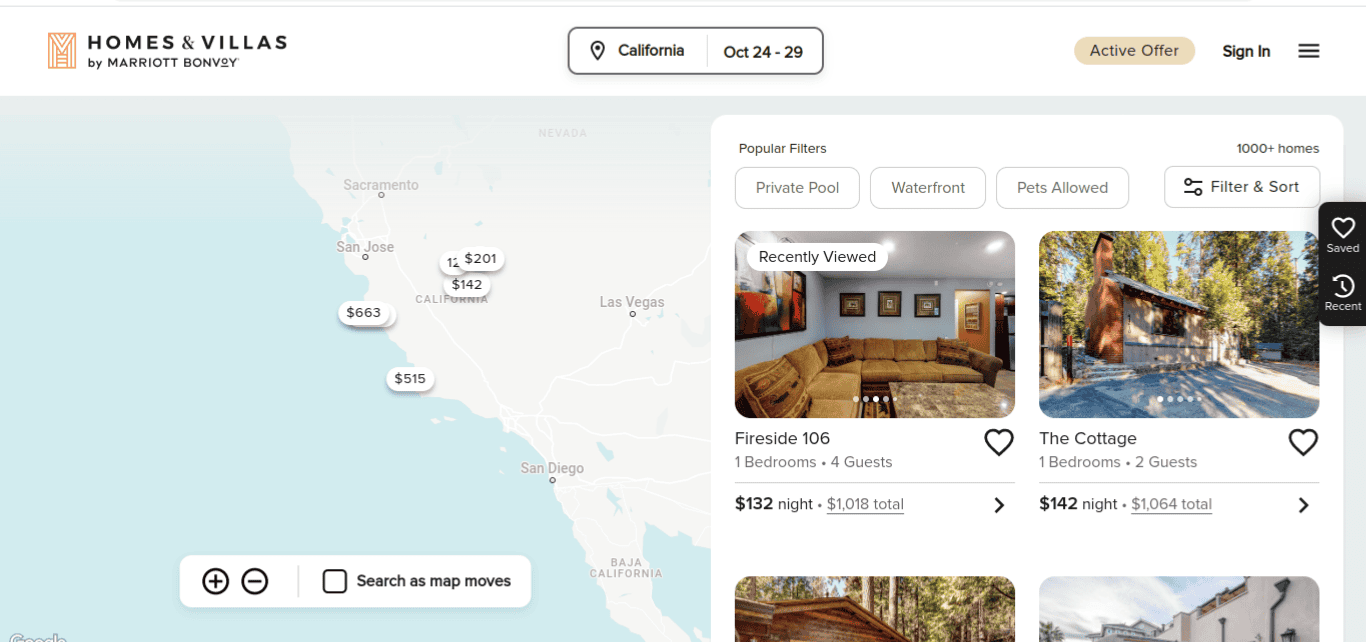
The main selling point of using Marriott for vacation rentals — apart from its brand name and property managers — is that you can earn and redeem Marriott Bonvoy points for stays. You can also earn one Elite Night Credit for every night stayed at Marriott Homes and Villas, putting you closer to elite status.
So if you have a Marriott Bonvoy credit card that you use for everyday spending, you’ll be able to enjoy some significant discounts when it comes time to book your vacation.
The Marriott Homes and Villas search function allows you to filter your search results based on price, amenities, house policies and more.
Clear cancellation policies accompany every listing, making it easy to understand your rights when booking.
The main drawback of Marriott Homes and Villas is its low reach. It currently has over 130,000 properties on offer compared to Airbnb’s 7.7 million listings — or Booking.com’s 28 million. This can make it hard to find a property exactly where and when you want.
Likewise, just because you can book with points doesn’t mean you should. In some cases, the redemption value can be low when booking Marriott Homes and Villas with your Marriott Bonvoy points.
You should always compare it to the equivalent cost in points of staying with a Marriott hotel — you may find a hotel is a more cost-effective option. To do this, simply divide the cash cost of your stay by the number of points required for an award stay. If you’re getting less than 1 cent per point, you should think twice before redeeming.
That said, if you have points to spare, points that’ll soon expire or are simply happy enough with the redemption value you’re receiving, then by all means go ahead and book with Marriott Homes and Villas.
5. Wyndham Vacasa: Professional Management for Vacation Rentals
The vacation rental company Vacasa bought Wyndham Rentals in 2019 and 2023 it became possible to redeem Wyndham points for stays with Vacasa Wyndham rentals. So if you have Wyndham points to spare, booking through Vacasa could be a solid option.
Wyndham Vacasa rentals can be found all over the United States, Canada, Mexico, Belize and Costa Rica. There are more than 15,000 Wyndham Vacasa rentals on offer.
They require a redemption of either 15,000 or 30,000 Wyndham Rewards points per bedroom per night, which is based on the average cost per bedroom per night, inclusive of all taxes and fees.
If the average cost is equal to $250 or less, you’ll pay 15,000 points per bedroom per night. If the average cost is between $250.01 and $500, you’ll need to pay 30,000 points per bedroom per night. Rentals with an average cost of $500.01 or higher are not eligible for payment with points.
When redeeming your Wyndham Vacasa points, you’ll want to ensure that you redeem them for properties that are slightly under $250 or slightly under $500. That way, you’ll get the greatest value for your points.
For instance, if you redeemed your points for a property that typically charges $249 per bedroom per night, you’d pay 15,000 points which would equal a redemption rate of ~1.6 cents per point — solid value. On the other hand, if you redeemed your points for a property that typically charges $251 per bedroom per night, you’d pay 30,000 points, giving you a redemption value of just ~0.8 cents.
On top of that, if you’re equipped with a Wyndham Earner credit card, you can benefit from a 10% discount on award stays, including Wyndham Vacasa rentals, increasing your per-point value even further. That could boost your redemption rate to ~1.8 cents apiece.
The Wyndham Vacasa rentals website is easy to navigate with an array of filters plus guest reviews.
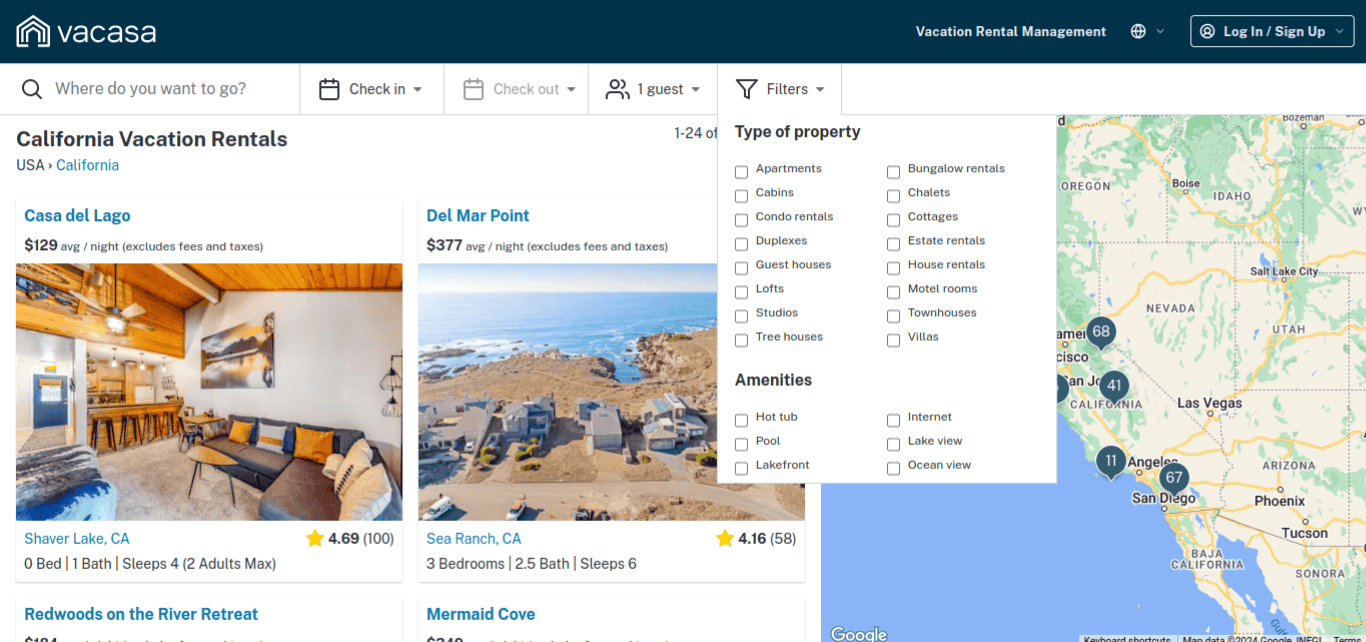
However, Wyndham Vacasa rentals do have a stricter cancellation policy, requiring notice of cancellation up to 30 days before your booking to make you eligible for a full refund. Likewise, you’ll have to complete your award booking over the phone as it’s not possible to book Wyndham Vacasa with points online.
Why Travelers Are Choosing Airbnb Alternatives
Despite Airbnb’s position in the rental market, there are many reasons you may want to opt for alternative accommodation options.
One of the first reasons is cost. The days of Airbnb’ing in someone’s front room on the cheap are — more or less — long gone. Airbnb is now largely dominated by professional property management companies looking to maximize their earnings on short-term rentals. While it’s not impossible to find affordable stays, Airbnb is missing much of what it used to be in terms of quality, cost-effectiveness and authentic local experiences.
Opting instead for budget hotels, guesthouses and hostels can be a great way to save on costs while ensuring an authentic experience. Likewise, websites such as HomeExchange can guarantee quality and authentic experiences at a much more affordable price.
A second reason for looking elsewhere than Airbnb is quality. While there are undoubtedly thousands of Airbnb hosts who provide quality experiences for their guests, you always run the risk of bad luck. Misleading pictures, unclear check-in policies and other negative experiences are always a possibility with Airbnb bookings.
Opting for a well-known hotel chain through Booking.com or a luxury rental through Wyndham Vacasa or Marriott Homes and Villas can help to ensure you avoid these blips of bad luck.
Lastly, staying with Airbnb alternatives can also enable you to better support local businesses. This is especially the case when it comes to local boutique hotels, B&Bs, guesthouses and hostels.
Stretching Your Travel Budget with Affordable Stays
If you want to save on accommodation to leave more room in your budget for the rest of your travels, there are a wide variety of options beyond Airbnb to look out for.
Hostels are one of your best options when it comes to saving money. You can opt for a single bed in a single-gender or mixed-gender dormitory, or even a private room with a double bed. Hostels often host events in their communal areas and organize tours, allowing you to meet other travelers and enjoy some authentic local experiences. In some cases, you can also enjoy complimentary breakfast at hostels. You can find quality hostels by using websites such as Hostelworld.
Budget hotels are another option. These hotels offer quality and comfort at an affordable price with more privacy than a hostel. These hotels tend to be part of larger chains so you tend to know what to expect in terms of quality.
Homestays and guesthouses are another option to consider if you’re after cost-effectiveness and authentic experiences. These places are typically run by families or couples and offer home-cooked meals and local recommendations. You can enjoy a comfortable stay and explore the area with the help of insider, local advice.
Extraordinary Escapes That Go Beyond Traditional Lodging
Beyond your typical hotel or vacation rental are unique properties that offer an extraordinary experience. These can be booked through Airbnb in addition to many other sites and directly through the host in some instances.
Some examples include:
- Treehouses — a way to live out your childhood dreams in forested destinations, whether it’s the U.S. or Costa Rica
- Yurts — an eco-conscious accommodation option offering a large circular tent, often in combination with “glamping” (glamorous camping) retreats
- Houseboats — waterfront accommodation providing a unique and tranquil experience, whether it’s Amsterdam or London
- Cave hotels — taking advantage of the natural landscape, cave hotels have become a popular way to combine modern, luxurious rooms with ancient architecture, such as in Turkey and Greece
- Tiny homes — small, minimalistic homes that provide a novel yet comfortable experience
Tips for Finding the Best Airbnb Alternatives
It’s easy to think Airbnb is your only option for affordable travel accommodation. But there are many other options out there to consider.
However, it’s important to have a solid strategy when you’re searching for accommodation.
You’ll want to begin by setting a maximum for your budget. For instance, if you’re looking for somewhere to stay for a maximum of 10 nights and you don’t want to spend more than $1,000, then you already can narrow your search down to places charging $100 or less per night. Although obvious, this first step is an easy way of narrowing your search down and prevents you from overspending on accommodation.
The next step is to consider your accommodation’s location. You might find an affordable guesthouse or hotel outside of town, but if it requires a one-hour commute to where you actually want to be, you’re likely going to end up spending too much on taxi or public transport fees.
Websites such as Booking.com allow you to organize your search based on the accommodation’s distance from your chosen location.
Once you’ve narrowed down how far away you’re willing to be from your chosen location, you’ll have likely already eliminated many properties from the decision-making process. From here, you can begin to read the guest reviews of the remaining properties and check out their amenities.
Focus not only on the rating but also on the total number of reviews. In certain cases, properties with only a handful of reviews, all of which are excellent, may receive five out of five stars. However, some of these reviews may unfortunately be fake, especially for new properties looking to get their foot in.
This is where it’s key to cross-check reviews of the same property across multiple websites. You can use a combination of websites such as Booking.com, Tripadvisor and Agoda, as well as Google Reviews, to get a more reliable overview of the quality of the property. You can also take advantage of “Traveler” photos (those uploaded by guests) on Tripadvisor to ensure that they match the same quality as those uploaded by the property’s host or management team (hint: watch out for generic stock photos or AI-generated photos).
Once you’ve found a property that ticks all the boxes, check what their cancellation policy is. For certain properties, you can cancel up to 24 hours before check-in with a full refund and no need for prepayment. With other properties, you need to cancel up to 30 days before check-in if you want a full refund.
Lastly, flexibility is always your friend. If you have the opportunity to travel on different dates, check the prices and see if you’d get a better deal by doing so. Some rental companies also offer long-term discounts as well as deals during off-peak travel seasons.
The Future of Travel Accommodations
In your search for affordability, unique or authentic experiences, there are many options beyond the likes of Airbnb.
Whether you want to book with points through Marriott or Wyndham Vacasa, take advantage of the breadth and ease of Booking.com or manage your budget at a hostel or guesthouse, there’s an option out there for every traveler.
Follow the strategy suggested above to ensure you get the most out of your next vacation rental.
New to the world of points and miles? The Chase Sapphire Preferred® Card is the best card to start with.
With a bonus of 75,000 bonus points after you spend $5,000 on purchases in the first 3 months from account opening. , 5x points on travel booked through the Chase TravelSM Portal and 3x points on restaurants, streaming services, and online groceries (excluding Target, Walmart, and wholesale clubs), this card truly cannot be beat for getting started!
Editors Note: Opinions expressed here are author’s alone, not those of any bank, credit card issuer, hotel, airline, or other entity. This content has not been reviewed, approved or otherwise endorsed by any of the entities included within the post.



